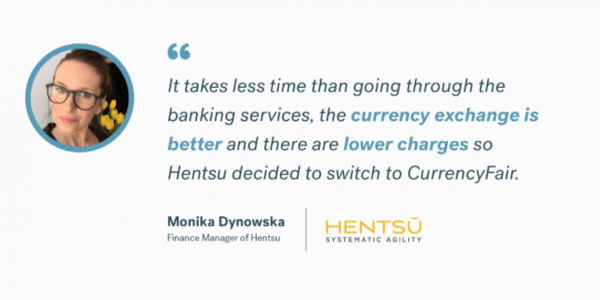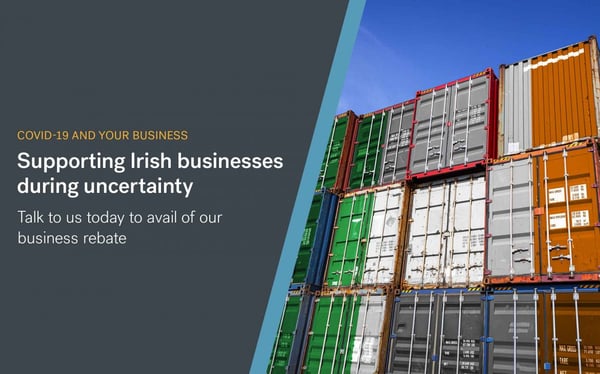Cash burn is a major concern for business leaders at any time, but right now we’re seeing conditions like no other. The COVID-19 situation has led to revenue loss, market instability, and even increased expenditures. It has forced many businesses to burn through their cash reserves.
We spoke to CurrencyFair’s CFO Ruth Fletcher, who shared her own advice for avoiding cash burn. Ruth is an award-winning finance professional, with decades of experience, mostly within global Fintech companies and startups. Her vast experience covers finance at all levels, from Finance Manager to Finance Controller and CFO.
Ruth understands what it takes to scale companies and their teams. She has overseen funding rounds, led her team in a major acquisition, and picked up a couple of awards along the way. In 2018 she was named CFO of the Year (at the Women in Finance Awards) and Fintech Leader of the Year (at the Women in Technology Awards, 2018).
What she doesn’t know about building a runway to avoid cash burn, probably isn’t worth knowing. Here are her 6 key tips.
1. Maximise revenue.
"Put simply, cash burn is all about how much money you have to keep going. How much of a runway you’ve got before you need to go back to investors. Or worse - before your business fails."
Obviously, it makes sense to boost revenue as much as possible so you have a healthy runway. Ruth advises business owners to get creative with the ways they go about this. Ask yourself:
-
Can you increase prices?
Knowing how price sensitive your customers are should guide you on where your specific price ceiling should be, as well as how much you can charge before there is a negative impact on sales volumes. Micro increases in price may not impact your individual customer materially, but may have a materially positive impact on your own revenue numbers.
-
Can you sell more?
Think beyond your usual customers, and your usual markets. Can you easily sell internationally? Can you automate some of your sales processes so you can spend more time actually selling and less time on sales administration?
And you should look for new opportunities. If your customers have stopped spending, find out who else needs your product or service.
Also, discover new ways to do business. If your existing sales routes have stalled, look for new ones. One of our own customers, VERVE Fitness, pivoted their route to market overnight. The gym equipment company were forced to close their showroom due to the lockdown in Queensland, and instantly became an online mail order business shipping machines out to confined customers. Ruth says:
"It’s not only about cost cutting, it’s about looking at everything holistically across the board."
2. Keep a handle on cash flow
Explore ways of both maximising cash into the business, and delaying money going out. Can customers pay upfront? Or can they pay at designated milestones, rather than at end or at delivery of service?
Talk to your Finance Manager about negotiating terms with suppliers. Look for providers that offer better prices for the same service. Can you negotiate payment terms? Consider asking to pay for certain large expenses in instalments. Or, if your Finance Manager has built a good relationship with them, perhaps your supplier can offer a discount. For example, if you need 12 licenses then maybe you could negotiate paying for just 10.
3. Examine your organisational culture
This is a long term strategy as opposed to a quick win. As Ruth says, “When faced with a crisis, a panic strategy doesn’t work.” This is about your whole company ethos. Ruth advocates for creating a culture where finance is prioritised and often discussed.
Take the time to ensure that all employees have basic finance skills. Don’t let numbers be the sole domain of the Finance Team. If everyone has a baseline understanding, then you can more easily talk about finance at all levels of the business. Hosting a monthly “lunch and learn” session where your Finance Manager takes other teams through everything from finance terminology to the different accounting periods can help bring down the barriers.
And don’t hold your P&L sheets close to your chest. Talk to your Heads of Department about costs at every opportunity. Where are they spending? How can they reduce expenses? Counsel your teams to always look for new ways of working more efficiently, not just during times of crisis.
4. Knowledge is power
Don’t bury your head in the sand, although it can be tempting. Always know your burn rate. Understand what kind of runway you have, before the business starts to burn cash. And share your information. Ensure that your management team understands the situation at every stage. Everyone should be aware of what the drivers are on your cost base, and what levers can be pulled to extend that runway further.
5. Hire wisely
We’re not all naturally numbers people. Even the most savvy of business leaders may prefer not to delve into the nitty gritty of a balance sheet. In that case, you need a strong finance professional on your team. As Ruth says:
"If you yourself are in no way financially inclined, get a trusted person beside you."
6. Minimise expenditure.
This is the solution that most leaders jump to when times are tough. Of course, you need to look at your costs and make sure you’re utilising all your budgets in the right way. According to Ruth, it comes down to knowing the return on investment of every single business expense.
For example, Ruth notes that currency exchange can quickly burn through cash, if you’re not careful. In her words, “I’ve worked in Fintech for 20 years. Working in global entities, I’ve always encountered exchange challenges.”
And with market volatility a side effect of the pandemic, it’s more important than ever to retain full control over your rates and any fees you’re paying.
"You can have subsidiaries in different currencies, but reporting back in a base currency. If the rates move and you haven’t actively taken steps to manage it then you can take a big hit at the end of the month."
CurrencyFair provides competitive rates and is completely transparent in terms of costs, so you always know the rate you’re getting and any cost involved. Before using CurrencyFair, when Ruth needed to send money overseas she had to call three banks to check for the best rate. And even then, she knew she wasn’t getting a great deal. Banks typically charge eight times more than FX providers such as CurrencyFair. Now, using CurrencyFair, she says:
"I’m consistently getting a great rate, without having to waste time calling various banks. It saves me time and hassle."
Finally, Ruth uses CurrencyFair’s multi-user access feature, enabling her Finance Team to carry out exchanges. She says:
"I know the rate is always competitive so I don’t need to oversee every transaction. At a glance, I can look at the account to see the rate that was achieved and the time. This allows our team to get the FX trade done quickly and efficiently, as they are not waiting for approval from me. I also use Dual Approval on payments as it ties in with our risk control model where we have a division of duties, which is key."
CurrencyFair offers two ways to exchange currencies - exchange instantly with our very competitive exchange rates, or you can set your own rate on our marketplace which could suit if you’re not in a hurry to exchange.





.png?width=600&name=Untitled%20design%20(6).png)






